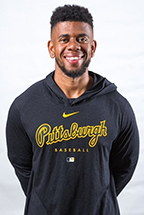
By Sylvester “Nunnie” Robinson
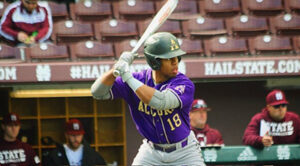
Suffice it to say that minority representation in all areas of Major League Baseball lags behind in terms of diversity, equity and inclusion, but we dare not fault MLB for its effort. Several progressive initiatives have been incorporated to increase minority representation from players to managers to upper management. TIDES aka The Institute for Diversity and Ethics in Sport (TIDES) at the University of Central Florida noted that Black players represented only 7.2 percent of all MLB players at the start of the current season. However, progress has been made, manifested in several forms: Kim Ng’s hiring as General Manager of the Marlins, Atlanta starting the Henry Aaron Fellowship program which creates a pathway for young minorities to gain front office experience and MLB and in coordination with MLBPA committing $10 million to help fund innovative programs designed by The Players Alliance to improve representation of Black Americans in all levels of baseball.
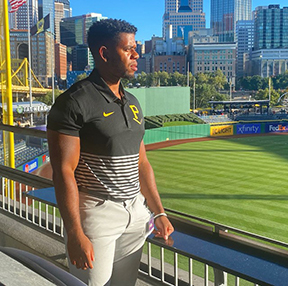 Brandon Rembert epitomizes the success of these programs. A former collegiate baseball player for Alcorn State University, Brandon currently works for the Pittsburgh Pirates Organization as a Minor League Baseball Operations Assistant. Born and raised in Pensacola, Florida, Brandon took up t-ball at a young age, developing a deep love for the game the older he became. Brandon played high school baseball at Booker. T Washington in Pensacola for 4 years, earning a varsity letter in 3 of those years. After graduating from high school in 2016, he signed with Faulkner University in Montgomery, Alabama to play baseball. After his freshman year at Faulkner, he opted to transfer to Coastal Alabama Community College in Brewton, Alabama. Brandon played one season there before arriving at his final destination, Alcorn State University in the fall of 2018. Rembert made an immediate impact when he stepped on campus, having a breakout season in 2019, leading the team in batting average and on base percentage. Rembert was named to the Pre-Season All-SWAC First Team, prior to his 2020 campaign. The 2020 season was cut short due to COVID-19, which allowed him to come back for a 5th year. Prior to his 2021 campaign, Brandon was named by Black College Nines as the 10th ranked MLB Draft Prospect in HBCU baseball. Playing the game that he loved was cruelly taken from him as he suffered a debilitating hamstring injury in the preseason of his 2021 season, which caused him to be sidelined for much of the year. Brandon completed his master’s degree in the fall of 2021 and was immediately hired as a Minor League Baseball Operations assistant by the Pittsburgh Pirates in February of 2022. His responsibilities included but weren’t limited to: data and video collection of players in the minor league system, assisting with batting cage and defensive field work, administrative work such as booking flights and player per diems. He has spent 2 seasons with the Pirates and is transitioning into the Amateur Scouting Department in 2024.
Brandon Rembert epitomizes the success of these programs. A former collegiate baseball player for Alcorn State University, Brandon currently works for the Pittsburgh Pirates Organization as a Minor League Baseball Operations Assistant. Born and raised in Pensacola, Florida, Brandon took up t-ball at a young age, developing a deep love for the game the older he became. Brandon played high school baseball at Booker. T Washington in Pensacola for 4 years, earning a varsity letter in 3 of those years. After graduating from high school in 2016, he signed with Faulkner University in Montgomery, Alabama to play baseball. After his freshman year at Faulkner, he opted to transfer to Coastal Alabama Community College in Brewton, Alabama. Brandon played one season there before arriving at his final destination, Alcorn State University in the fall of 2018. Rembert made an immediate impact when he stepped on campus, having a breakout season in 2019, leading the team in batting average and on base percentage. Rembert was named to the Pre-Season All-SWAC First Team, prior to his 2020 campaign. The 2020 season was cut short due to COVID-19, which allowed him to come back for a 5th year. Prior to his 2021 campaign, Brandon was named by Black College Nines as the 10th ranked MLB Draft Prospect in HBCU baseball. Playing the game that he loved was cruelly taken from him as he suffered a debilitating hamstring injury in the preseason of his 2021 season, which caused him to be sidelined for much of the year. Brandon completed his master’s degree in the fall of 2021 and was immediately hired as a Minor League Baseball Operations assistant by the Pittsburgh Pirates in February of 2022. His responsibilities included but weren’t limited to: data and video collection of players in the minor league system, assisting with batting cage and defensive field work, administrative work such as booking flights and player per diems. He has spent 2 seasons with the Pirates and is transitioning into the Amateur Scouting Department in 2024.
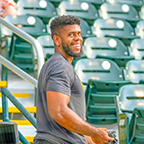 Brandon’s compelling story caught the attention of Westside Gazette publisher Bobby R. Henry, who, after speaking with Brandon, realized that his story needed to told. My personal intuition tells me Brandon wants to share his story with others, knowing that the opportunities for minorities in MLB are numerous, accessible and limitless.
Brandon’s compelling story caught the attention of Westside Gazette publisher Bobby R. Henry, who, after speaking with Brandon, realized that his story needed to told. My personal intuition tells me Brandon wants to share his story with others, knowing that the opportunities for minorities in MLB are numerous, accessible and limitless.
The WG put together a few questions to gain a better perspective and insight into this amazing and ambitious young man, the second oldest of seven children. His younger brother, Christopher Rembert, is committed to Auburn University for baseball, a part of the 2024 Auburn recruiting class.
WG: 1. How did your journey in baseball begin?
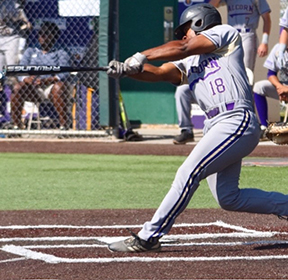 Brandon: My journey in baseball began when I was about 3 or 4 years old. I began playing t-ball around that age and my love for the game just took a crescendo after that. I had an older brother that played baseball and I always wanted to do what he did as a kid, which was play baseball. Once I found that I wasn’t half bad at the sport, I just fell in love with the game and was interested to see how far I could go within the game. I ended up playing all the way up to college at the Division 1 level, which was one of my dreams when I was younger.
Brandon: My journey in baseball began when I was about 3 or 4 years old. I began playing t-ball around that age and my love for the game just took a crescendo after that. I had an older brother that played baseball and I always wanted to do what he did as a kid, which was play baseball. Once I found that I wasn’t half bad at the sport, I just fell in love with the game and was interested to see how far I could go within the game. I ended up playing all the way up to college at the Division 1 level, which was one of my dreams when I was younger.
WG: 2. What positions or assignments were given prior to present?
Before I was with the Pittsburgh Pirates in my current role, I took up coaching. I was the assistant coach of my alma mater high school team, where I specialized in hitting and outfield. At the same time, I was the head coach of a local 9u travel baseball team. These both lasted for about 2-3 months because I then got a job offer from the Pittsburgh Pirates in February 2022. I just finished up my second season with the Pirates as a Minor League Baseball Operations Assistant and am now transitioning into a new role in Amateur Scouting come 2024.
Brandon: 3. Did you play baseball in high school or college?
I played baseball in both high school and college. In high school I played for Booker T. Washington. I played for 4 years, obtaining a varsity letter in 3 of the 4 years. I played college baseball for 3 different schools. After I graduated high school, I first signed to Faulkner University in Montgomery, Alabama. After one year there, I transferred to a junior college in Brewton, Alabama called Coastal Alabama Community College. After playing one season there, I transferred to my final college in Alcorn State University where I played baseball for 3 seasons from 2019-2021.
WG: 4. Did you have role models who guided or nurtured your affinity or love for the game?
I feel like there were a lot of people that helped me in my affinity. Like I mentioned previously, my older brother was a big baseball fan, and we had a tremendous number of conversations around the game of baseball. He and I were competitive, so he always pushed me to become better in the sport. My maternal grandfather was also a big part in that journey. He was also a big baseball fan and would carry me to all of my practices and would be at the majority of my baseball games. We would also have a lot of conversations centered around the game. I was very grateful for his impact on my life. My parents were also detrimental in that journey because they would carry me to my tournaments and pay for equipment and things like that.
Brandon: 5. How do you explain the scarcity of African Americans in baseball today?
I believe that the scarcity in baseball first stems from the fact that it can be less affordable than other sports like basketball and football. Playing travel baseball can costs upwards of $1,000 and that is just simply not feasible for a lot of people, especially where they can play a different sport that is a lot cheaper in price. I think the other is representation. A lot of African American kids don’t see a ton of people like them playing the sport of baseball, where they do in other sports like basketball and football. The basketball and football players then end up being people that they look up to instead of the baseball players. I feel like when African American representation in Major League Baseball goes up, the number of kids that would want to play it will too.
WG: 6. Is MLB doing enough or anything to narrow the gap on the field, in the front office, at all? And are there specific programs employed by MLB to be more inclusive?
Brandon: There has definitely been action by the MLB to close that gap. From an on-field perspective, MLB has helped HBCU’s gain more exposure by giving them more exposure. An example would be the Andre Dawson Classic hosted by MLB at the beginning of every college baseball season for Division 1 HBCU’s to participate in. It is a televised tournament that helps them get more exposure. The Swingman Classic is also something new that MLB has put in place for HBCU athletes. It is an all-star game for Division 1 HBCU baseball players that helps get the more exposure that they might not normally get during the course of a season. The MLB has started numerous programs in order to help diversity within the front office also. Tyrone Brooks is the Senior Director, Front Office and Field Staff Diversity Pipeline Program at Major League Baseball. He has helped numerous people of color get into the game of baseball from an off-field perspective. MLB has programs that also help push baseball and softball within inner cities. I believe introducing kids to baseball at a young age will help continue to close that gap. In the 2022 draft, 4 of the top 5 draft pick were of African American decent, so we are starting to move in the right direction.
WG: 7. What percentage of minorities presently occupy baseball positions like scouting or managing from your perspective?
Brandon: I don’t know the exact number, but I’d have to say around 20-30%. I’m not sure the accuracy of that, but that would be my best guess. It’s a low number for sure. But it is slowly getting better. All that matters is we continue that forward trend on this subject.
WG: 8. Do you envision a day when minority representation in MLB will equal the overall population in America?
Brandon: I do desire for that to happen. But if it were to happen, it would be years and years from now. There is a lot of work that needs to take place in order for that to happen on all sides of Major League Baseball. So, my answer is yes, it is definitely possible. But, I do not see that happening within the next decade. Maybe another decade from now, we can have that conversation and see an equilibrium in Major League Baseball.
WG: 9. Do you anticipate the continued dominance of Latin players in MLB?
Brandon: I do anticipate the continued dominance of Latin players in the MLB. Baseball is incredibly popular in Latin countries. People there eat, breathe, and live baseball. They train incredibly hard, and for some, it is their ticket out of their respective countries. Baseball training there starts at a young age and the talent level that comes out of these countries is just incredible. International players can also sign earlier than American players would, so the Latin players that are in a professional baseball could be as young as 16 years old. There isn’t a reason that I can think of that Latin players wouldn’t stay impactful within the game like they are now.
WG: 10.What are personal goals regarding MLB? Do you see your present track as permanent?
Brandon: Some of my personal goals are to continue to climb the ladder within the organization and be the best worker that I can be. I very thankful to have this opportunity in professional and I would want to make a long career out of it. I’m not sure would the end goal would be, but I just want to continue to make that climb and see how things shake out for me. Obviously, nothing is permanent in this industry and things can change in the blink of an eye. But the main objective is to continue to climb. As of now though, I just want to be the best worker that I can be right now. I want to continue to add value to my organization and give them everything that I have.
P.S. If you read this story and are perhaps interested in a MLB career, contact me at the WG: (954) 525-1489



Be the first to comment